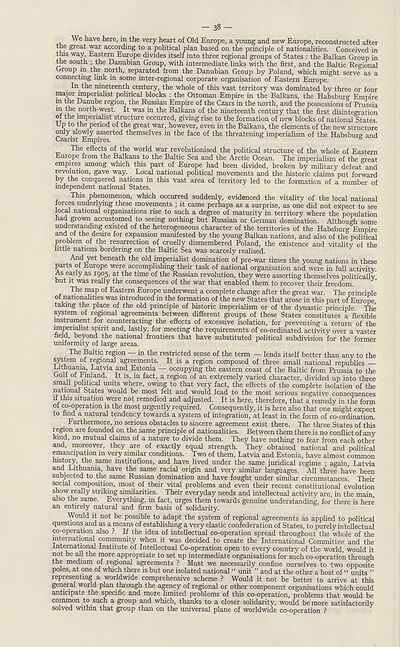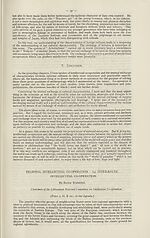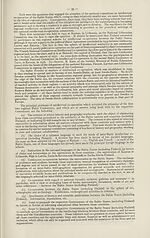International > Proceedings of the second General conference of national committees on intellectual co-operation, Paris, July 5th-9th, 1937
(40)
Download files
Complete book:
Individual page:
Thumbnail gallery: Grid view | List view

_ 38 -
We have here, in the very heart of Old Europe, a young and new Europe, reconstructed after
the great war according to a political plan based on the principle of nationalities. Conceived in
this way. Eastern Europe divides itself into three regional groups of States : the Balkan Group in
the south ; the Danubian Group, with intermediate links with the first, and the Baltic Regional
Group m the north, separated from the Danubian Group by Poland, which might serve as a
connecting link in some inter-regional corporate organisation of Eastern Europe.
In the nineteenth century, the whole of this vast territory was dominated by three or four
major imperialist political blocks : the Ottoman Empire in the Balkans, the Habsburg Empire
in the Danube region, the Russian Empire of the Czars in the north, and the possessions of Prussia
m the north-west. It was in the Balkans of the nineteenth century that the first disintegration
of the imperialist structure occurred, giving rise to the formation of new blocks of national States.
Up to the period of the great war, however, even in the Balkans, the elements of the new structure
only.slowly asserted themselves in the face of the threatening imperialism of the Habsburg and
Czanst Empires. b
The effects of the world war revolutionised the political structure of the whole of Eastern
Europe from the Balkans to the Baltic Sea and the Arctic Ocean. The imperialism of the great
empires among which this part of Europe had been divided, broken by military defeat and
revolution, gave way. Local national political movements and the historic claims put forward
by the conquered nations in this vast area of territory led to the formation of a number of
independent national States.
This phenomenon, which occurred suddenly, evidenced the vitality of the local national
forces underlying these movements ; it came perhaps as a surprise, as one did not expect to see
local national organisations rise to such a degree of maturity in territory where the population
had grown accustomed to seeing nothing but Russian or German domination. Although some
understanding existed of the heterogeneous character of the territories of the Habsburg Empire
and of the desire for expansion manifested by the young Balkan nations, and also of the political
problem of the resurrection of cruelly dismembered Poland, the existence and vitality of the
little nations bordering on the Baltic Sea was scarcely realised.
And yet beneath the old imperialist domination of pre-war times the young nations in these
parts of Europe were accomplishing their task of national organisation and were in full activity.
As early as 1905, at the time of the Russian revolution, they were asserting themselves politically
but it was really the consequences of the war that enabled them to recover their freedom.
The map of Eastern Europe underwent a complete change after the great war. The principle
of nationalities was introduced in the formation of the new States that arose in this part of Europe,
taking the place of the old principle of historic imperialism or of the dynastic principle. The
system of regional agreements between different groups of these States constitutes a flexible
instrument for counteracting the effects of excessive isolation, for preventing a return of the
1iI1Reri^llSt Spint lastly> for meetin& the requirements of co-ordinated activity over a vaster
field, beyond the national frontiers that have substituted political subdivision for the former
uniformity of large areas.
The Baltic region — in the restricted sense of the term — lends itself better than any to the
system of regional agreements. It is a region composed of three small national republics
Lithuania, Latvia and Estonia — occupying the eastern coast of the Baltic from Prussia to the
Guit ot h inland. It is, m fact, a region of an extremely varied character, divided up into three
small political units where, owing to that very fact, the effects of the complete isolation of the
national States would be most felt and would lead to the most serious negative consequences
1 this situation were not remedied and adjusted. It is here, therefore, that a remedy in the form
of co-operation is the most urgently required. Consequently, it is here also that one might expect
to find a natural tendency towards a system of integration, at least in the form of co-ordination.
. Furthermore, no serious obstacles to sincere agreement exist there. The three States of this
region are founded on the same principle of nationalities. Between them there is no conflict of any
kind, no mutual claims of a nature to divide them. They have nothing to fear from each other
and, moreover, they are of exactly equal strength. They obtained national and political
emancipation m very similar conditions. Two of them, Latvia and Estonia, have almost common
^tor^the same institutions, and have lived under the same juridical regime ; again, Latvia
and Lithuania, have the same racial origin and very similar languages. All three have been
subjected to the same Russian domination and have fought under similar circumstances. Their
social composition, most of their vital problems and even their recent constitutional evolution
show really striking similarities. Their everyday needs and intellectual activity are, in the main,
also the same. Everything, in fact, urges them towards genuine understanding, for there is here
an entirely natural and firm basis of solidarity.
Would it not be possible to adapt the system of regional agreements as applied to political
questions and as a means of establishing a very elastic confederation of States, to purely intellectual
co-operation also ? If the idea of intellectual co-operation spread throughout the whole of the
international community when it was decided to create the International Committee and the
International Institute of Intellectual Co-operation open to every country of the world, would it
not be all the more appropriate to set up intermediate organisations for such co-operation through
the medium of regional agreements ? Must we necessarily confine ourselves to two opposite
poles, at one of which there is but one isolated national “ unit ” and at the other a host of “ units ”
representing a worldwide comprehensive scheme ? Would it not be better to arrive at this
general world plan through the agency of regional or other component organisations which could
anticipate the specific and more limited problems of this co-operation, problems that would be
common to such a group and which, thanks to a closer solidarity, would be more satisfactorily
solved within that group than on the universal plane of worldwide co-operation ?
We have here, in the very heart of Old Europe, a young and new Europe, reconstructed after
the great war according to a political plan based on the principle of nationalities. Conceived in
this way. Eastern Europe divides itself into three regional groups of States : the Balkan Group in
the south ; the Danubian Group, with intermediate links with the first, and the Baltic Regional
Group m the north, separated from the Danubian Group by Poland, which might serve as a
connecting link in some inter-regional corporate organisation of Eastern Europe.
In the nineteenth century, the whole of this vast territory was dominated by three or four
major imperialist political blocks : the Ottoman Empire in the Balkans, the Habsburg Empire
in the Danube region, the Russian Empire of the Czars in the north, and the possessions of Prussia
m the north-west. It was in the Balkans of the nineteenth century that the first disintegration
of the imperialist structure occurred, giving rise to the formation of new blocks of national States.
Up to the period of the great war, however, even in the Balkans, the elements of the new structure
only.slowly asserted themselves in the face of the threatening imperialism of the Habsburg and
Czanst Empires. b
The effects of the world war revolutionised the political structure of the whole of Eastern
Europe from the Balkans to the Baltic Sea and the Arctic Ocean. The imperialism of the great
empires among which this part of Europe had been divided, broken by military defeat and
revolution, gave way. Local national political movements and the historic claims put forward
by the conquered nations in this vast area of territory led to the formation of a number of
independent national States.
This phenomenon, which occurred suddenly, evidenced the vitality of the local national
forces underlying these movements ; it came perhaps as a surprise, as one did not expect to see
local national organisations rise to such a degree of maturity in territory where the population
had grown accustomed to seeing nothing but Russian or German domination. Although some
understanding existed of the heterogeneous character of the territories of the Habsburg Empire
and of the desire for expansion manifested by the young Balkan nations, and also of the political
problem of the resurrection of cruelly dismembered Poland, the existence and vitality of the
little nations bordering on the Baltic Sea was scarcely realised.
And yet beneath the old imperialist domination of pre-war times the young nations in these
parts of Europe were accomplishing their task of national organisation and were in full activity.
As early as 1905, at the time of the Russian revolution, they were asserting themselves politically
but it was really the consequences of the war that enabled them to recover their freedom.
The map of Eastern Europe underwent a complete change after the great war. The principle
of nationalities was introduced in the formation of the new States that arose in this part of Europe,
taking the place of the old principle of historic imperialism or of the dynastic principle. The
system of regional agreements between different groups of these States constitutes a flexible
instrument for counteracting the effects of excessive isolation, for preventing a return of the
1iI1Reri^llSt Spint lastly> for meetin& the requirements of co-ordinated activity over a vaster
field, beyond the national frontiers that have substituted political subdivision for the former
uniformity of large areas.
The Baltic region — in the restricted sense of the term — lends itself better than any to the
system of regional agreements. It is a region composed of three small national republics
Lithuania, Latvia and Estonia — occupying the eastern coast of the Baltic from Prussia to the
Guit ot h inland. It is, m fact, a region of an extremely varied character, divided up into three
small political units where, owing to that very fact, the effects of the complete isolation of the
national States would be most felt and would lead to the most serious negative consequences
1 this situation were not remedied and adjusted. It is here, therefore, that a remedy in the form
of co-operation is the most urgently required. Consequently, it is here also that one might expect
to find a natural tendency towards a system of integration, at least in the form of co-ordination.
. Furthermore, no serious obstacles to sincere agreement exist there. The three States of this
region are founded on the same principle of nationalities. Between them there is no conflict of any
kind, no mutual claims of a nature to divide them. They have nothing to fear from each other
and, moreover, they are of exactly equal strength. They obtained national and political
emancipation m very similar conditions. Two of them, Latvia and Estonia, have almost common
^tor^the same institutions, and have lived under the same juridical regime ; again, Latvia
and Lithuania, have the same racial origin and very similar languages. All three have been
subjected to the same Russian domination and have fought under similar circumstances. Their
social composition, most of their vital problems and even their recent constitutional evolution
show really striking similarities. Their everyday needs and intellectual activity are, in the main,
also the same. Everything, in fact, urges them towards genuine understanding, for there is here
an entirely natural and firm basis of solidarity.
Would it not be possible to adapt the system of regional agreements as applied to political
questions and as a means of establishing a very elastic confederation of States, to purely intellectual
co-operation also ? If the idea of intellectual co-operation spread throughout the whole of the
international community when it was decided to create the International Committee and the
International Institute of Intellectual Co-operation open to every country of the world, would it
not be all the more appropriate to set up intermediate organisations for such co-operation through
the medium of regional agreements ? Must we necessarily confine ourselves to two opposite
poles, at one of which there is but one isolated national “ unit ” and at the other a host of “ units ”
representing a worldwide comprehensive scheme ? Would it not be better to arrive at this
general world plan through the agency of regional or other component organisations which could
anticipate the specific and more limited problems of this co-operation, problems that would be
common to such a group and which, thanks to a closer solidarity, would be more satisfactorily
solved within that group than on the universal plane of worldwide co-operation ?
Set display mode to:
![]() Universal Viewer |
Universal Viewer | ![]() Mirador |
Large image | Transcription
Mirador |
Large image | Transcription
Images and transcriptions on this page, including medium image downloads, may be used under the Creative Commons Attribution 4.0 International Licence unless otherwise stated. ![]()
| League of Nations > International > Proceedings of the second General conference of national committees on intellectual co-operation, Paris, July 5th-9th, 1937 > (40) |
|---|
| Permanent URL | https://digital.nls.uk/195217695 |
|---|
| Shelfmark | LN.XII |
|---|
| Description | Over 1,200 documents from the non-political organs of the League of Nations that dealt with health, disarmament, economic and financial matters for the duration of the League (1919-1945). Also online are statistical bulletins, essential facts, and an overview of the League by the first Secretary General, Sir Eric Drummond. These items are part of the Official Publications collection at the National Library of Scotland. |
|---|---|
| Additional NLS resources: |
|

